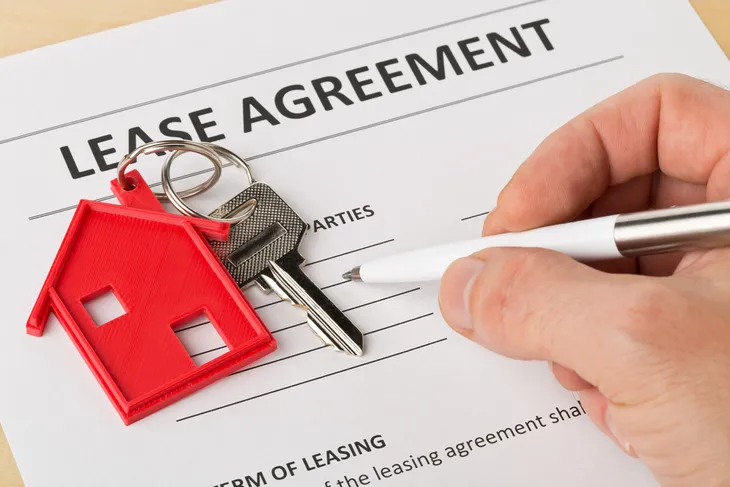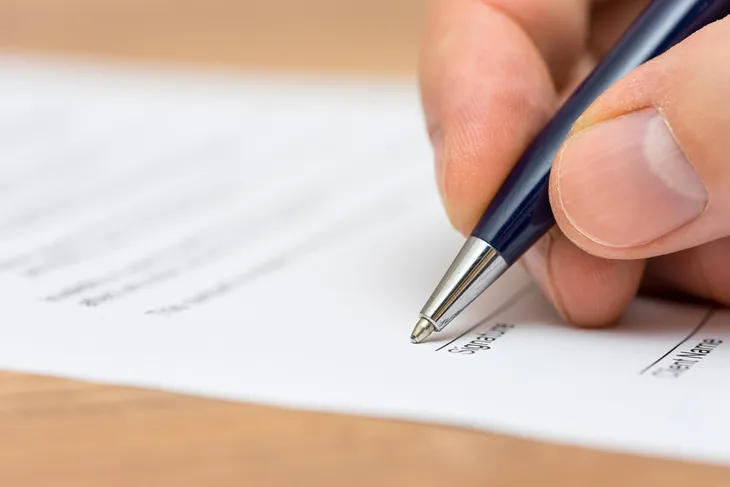Most homebuyers need a mortgage to finance the purchase of their house. Very few of us can afford to buy a house outright, with cash. So we seek out a loan from a bank or other financial institution that offers mortgages. In order to qualify, you need a good credit score and a chunk of cash for a down payment. Without these things, home ownership has traditionally been out of reach. However, there’s an alternative to this standard home buying route. We’re talking about those rent to own real estate listings. They are a process where you rent a home for a certain amount of time, with the option to buy it when the lease expires. In this article, we look at how rent to own real estate programs work. We’ll also discuss the pros and cons, and whether participating in one might make sense for you.
How Rent-To-Own Programs Work
Rent to own real estate deals consist of two separate parts. There’s a standard Lease Agreement, which is similar to renting any other place. However, there’s also an Option to Buy added to the paperwork. It’s important to note that these are two different documents, each with their own set of financial details and obligations.
Some rent to own contracts are more flexible than others. You may see the different options referred to as “Lease-Option” or “Lease-Purchase” agreements. They are set up slightly differently, so make sure you know which one you’re pursuing.
Lease-Options
Lease-option contracts give you the right (but not the obligation) to buy a house at the end of a lease. If you decide to not buy the house at the end of the lease, the option merely expires. You can walk away at that point, with no further obligation to continue renting. After this, you’ll have to either sign a new agreement to stay in that location or look for another place to live.
On the other hand, the owner of the house may still decide to sell the house even if you aren’t interested in buying. You may still end up needing a new place to live if you decline a lease-option. The lease-option form of rent to own deal is, by far, the most flexible type of deal for everyone involved. As we’ll discuss later, this can be both good and bad.
Lease-Purchase
As you probably expected, a Lease-Purchase contract is a less flexible version of a rent to own deal. It’s a pre-determined agreement to buy the house once the lease term has expired. It may even include the purchase price. If you’re exploring a rent to own real estate program, make sure you know whether it’s lease-option or lease-purchase.
Sometimes the complex legalese of these contracts can be confusing. You may be legally obligated to buy the house at the end of the lease — whether you can afford it or not. It’s always a good idea to seek the advice of a qualified real estate lawyer before you sign a rent to own deal.
When The Lease Ends
Depending in the type of rent to own agreement you choose, you have a few different options once the term of the lease expires. If you signed a lease-option, you have the ability to walk away completely. Maybe you weren’t able to save up a own payment or qualify for a mortgage yet. That would mean delaying your dream of buying a house.
On the other hand, maybe you signed a lease-purchase contract. That means you now have to buy the house. Hopefully, you knew about this obligation ahead of time and have been preparing for it. That means shopping around for an affordable mortgage to obtain the funding you need to complete the purchase. Qualifying for a mortgage is much different than being approved as a tenant, so make sure your finances are in good standing for this step.
Purchase Price
If you’ve been paying attention to the housing market at all lately, you know that that prices can rise and fall (but mostly rise, based on recent trends) drastically in a short amount of time. When it comes to determining the purchase price of a house in a rent to own contract, there’s a couple extra wrinkles involved. For example, there may be a lease term of multiple years at the start of the deal. What the house is valued at on Day One is probably not going to be the same as Day 365. (Or at the end of two, three, or five years, for that matter).
Your rent to own agreement should clearly spell out how and when the price of the home will be determined. In some cases, the sale price is determined when the contract is signed. It’s often a higher-than-current-market-value price, since the deal assumes the value of the house will go up during the lease term. In other cases, the sale price is to be determined at the end of the lease term, based on whatever the market value is at that time. Either choice involves a slight risk, as you never truly know what the housing market will do. However, there’s peace of mind for buyers who can “lock-in” the purchase price at the start of the lease term. That way they know exactly how much they need to budget for when it comes time to buy.
Pros of Rent-to-Own Programs
Like we said, there are definitely some attractive aspects of using a rent to own program in order to buy a house. Here are some of the best features, if you opt for one of these deals.
Flexibility
A rent-to-own agreement can be a great option for anyone who wants to own a home, but isn’t quite ready to take the plunge. They just need a little more time to get their finances in order. These agreements provide the flexibility needed, by giving potential buyers time to save a down payment, improve their credit score, and secure mortgage financing. These programs also enable people to “lock in” a house they’d like to eventually own, while continuing to save for it.
Paying Down Principal
This is one of the more attractive parts of rent to own agreements. In most contracts, a portion of the monthly rent is actually applied towards the principal cost of the house. That means you can build up a bit of equity before you even officially buy the house. For example, let’s say you paid $1,500 in monthly rent, for a three-year lease term. Your rent to own agreement states that 25% of that will be credited towards the purchase of the house. That means $375 a month (or $13,500 by the end of three years) goes towards buying the house.
There are some caveats here, though. For starters, the monthly rent is often a bit higher in rent to own deals. After all, the cost needs to include both the normal rent, plus the portion going towards the principal cost of the house. However, that extra cost is basically forcing you to save up a down payment. This percentage can vary wildly. In some cases, a majority of your monthly payments can be put towards the purchase price. In others, none of your monthly rent actually gets your close to buying the house. These types of deals are obviously less desirable, and should be avoided.
Forced Savings
Sticking with our above example, what happens to that $13,500 if you decide to walk away from the buy option after the lease term expires? The good news is that most rent to own contracts include an option to “cash out” that equity if the purchase doesn’t happen.
Cons of Rent-to-Own Programs
As with most things financial, there are some negative aspects of rent-to-own real estate programs, to go along with the positives. These types of deals aren’t perfect for every person or every situation. There are a few big drawbacks that might make you think twice about agreeing to a rent to own real estate deal. Here are the main cons you’ll encounter.
Non-Refundable Fees
Most rent-to-own agreements require a one-time, non-refundable fee. It’s usually called the option fee (or sometimes the option money or option consideration). Paying this fee is the thing that provides you with the option to buy the house when the lease term ends. The option fee is often negotiable. However, it typically ranges between 1% and 5% of a home’s purchase price.
If you choose to walk away from the purchase option at the end of the lease, you won’t have this fee refunded. As you can see, opting for a rent to own agreement isn’t for anyone still on the fence about buying a house. If you are forced to back out of the buying option, the higher-than-market rent price and these options fees will just cost you more money in the long run.
Purchase Price
We already talked a bit about purchase price. It can actually be both a pro and a con. On one hand, you can “lock in” the price of the house years in advance. That might end up being a big win, if the value of the house increases by a lot in that time. It’s also nice to know exactly how much you need to budget for when it comes to applying for mortgage approval.
On the other hand, sometimes the purchase price is not pre-determined. In many rent to own deals, the purchase price is to be determined by market value at the end of the lease term. That could be a major problem if housing prices explode up in your market. You may be planning, for example, to buy a house for $500,000 in three years. But if the market value of that house is actually $750,000 by the end of the lease, you could be priced out. Too bad you paid higher rent for years and non-refundable fees, only to have to walk away from the deal.
Maintenance Costs
One of the advantages of renting (as opposed to buying) a home is being able to rely on your landlord for maintenance. They will replace dead appliances, fix the furnace if needed, and provide general handyman work replacing faulty light fixtures. Since they still own the property, they cover these costs.
In a rent to own deal, you might end up being responsible for these costs instead. This can also include things like lawncare or snow removal. In short, rent to own deals can sometimes feel like all the responsibilities and costs of owning a house, without actually owning it. You may still need to take out a renters insurance policy, even though you’re paying for things that the owner or landlord would normally cover. Make sure you read the fine print of any rent to own contract carefully. In fact, have a lawyer read it over too. These home maintenance responsibilities (and costs) are sometimes negotiable, so feel free to push back a bit.
Should You Use a Rent to Own Deal?
Not everyone who buys a house is the ideal candidate for these types of deals. Typically, these agreements are designed for aspiring homeowners who just need a bit more time to get their finances in order. They provide a “buffer” that can be used to save up an increased down payment, build your credit score, or shop for a mortgage. Additionally, some of the rent money will go towards the purchase price. That makes it a good middle ground for those who are “close” to being able to buy a house, but not quite there yet.
Rent to own contracts are also ideal for those who can’t qualify for conforming loans.
“As home prices rise and more and more cities are priced out of conforming loan limits and pushed into jumbo loans, the problem shifts from consumers to the home finance industry,” says Marjorie Scholtz, CEO of Verbhouse, a rent to own startup business. “Anything unusual—in income, for example—tosses good income earners into an ‘outlier’ status because underwriters can’t fit them neatly into a box,” Scholtz added.
That means traditional mortgages can be difficult for certain people to obtain. That includes the self-employed, contract workers, or those who don’t have long U.S. credit histories. It also applies to those who can’t save the 20% down payment that many mortgage lenders require.
Before You Sign a Contract
If you’ve been struggling to get into the housing market, a rent to own deal might make sense for you. Before you sign any contracts, here’s a quick refresher of the main things you need to know.
- Aim for a Lease-Option instead of a Lease-Purchase. That way you won’t be obligated to buy the house at the end of the lease.
- Research the house (and surrounding neighbourhood). Understand what a reasonable purchase price would be.
- Make sure you understand any important deadlines and the costs associated with them. That includes option fees, rent payments, and any other costs.
- Know how to exercise your option to buy (or not). There may be a hard deadline, so ensure you don’t miss it. You likely have to exercise this option in writing.
- Know exactly who is responsible undertaking and paying for general house maintenance.
It also makes sense to research the seller. You can potentially check their credit report too. Then look for any sign of financial trouble. The longer they have owned the property — and the more equity they have — the better the deal likely is. Finally, we want to (once again) remind you that a rent to own real estate deal is a significant legal agreement. You should always have independent legal advice from a qualified professional whenever you’re buying a house — even a rent to own agreement.
The Bottom Line
Rent to own agreements can definitely be beneficial. They are great for anyone who wants to own a particular house, but still needs some time to get their finances in order. However, not all rent-to-own programs are the same. Some of these programs come with high fees. Others will legally obligate you to purchase a house at the end of a lease term, whether you can afford it or not.
The best rent to own agreements are the ones that provide the most flexibility. They enable you to walk away at the end of a lease, if you choose. If you’re not completely certain that you’ll be able to buy the house after the lease term, getting a flexible contract is your best bet. Be sure to read the terms and conditions carefully. Have a lawyer double check the fine print. Under the right conditions, a rent to own real estate program could be the perfect way to buy a house.













